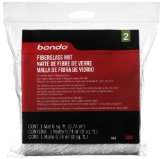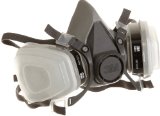Why should we fiberglass the telescope tube?
Using the cardboard tube is ok and it will work acceptably but... There are a couple of things to consider. It isn't as rigid as we would like it to. This means that as you are using it the weight of the mirror is going to distort it a little bit. And a little bit is enough to make a difference in a telescope. You may have to adjust the mirror over the course of your sky viewing.
If you fiberglass the tube it will not give at all. This means that it will stay adjusted better. You will have to adjust it much less often.
The effects of time
And, over the course of time that cardboard tube is going to be affected by heat, humidity and temperature changes. This means more adjustments and less reliability. But fiberglass is famous for not being affected at all by heat, humidity or temperature changes. Simple as that.
So, if you fiberglass the tube you will get a more reliable telescope that is stronger, easier to adjust and with a much longer life span. And all of this is exacerbated if you plan on storing your telescope in the basement or out in the garage.
So let's go ahead and fiberglass it
Safety Note: Fiberglass is used all the time by people. Nothing to be afraid of but it does contain something called Volatile Organic Compounds (VOC's) which should not be inhaled in large amounts. So, you should take safety precautions against inhaling it. And the cloth is made of glass fibers which spread easily and can irritate your skin. This means take other precautions.
So... Work outdoors, wear a respirator and wear latex gloves and long sleeve shirts. And do all this safety gear when applying the fiberglass resin and when sanding it.
This is the resin and the fiberglass mat that I bought for this project. The mask is a different model but almost identical and this one is a little bit cheaper.
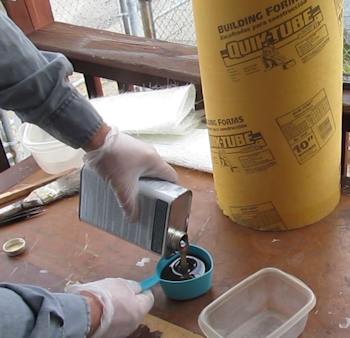
We start the fiberglass by measuring out some of the liquid resin. I poured out one cup.
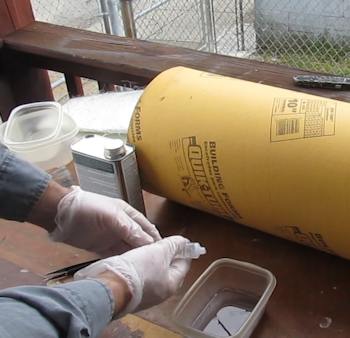
Then we add a small amount of something called the hardener.
The resin tells you how much to add. It goes by drops. It is a small amount in comparison to the resin.
Then Mix it.
Now you have maybe about ten minutes to work with it so work briskly. And this is why we only mix it one cup at a time. So we can use it all up before it dries and is wasted.
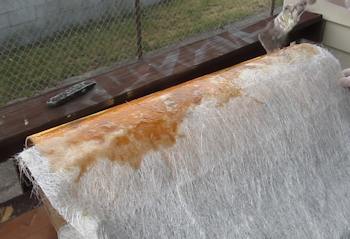
Now put your fiberglass cloth on the tube and start applying the resin to it. Dab it on. Get it to soak right through the cloth and into the cardboard of the tube.
Note about the cloth - It comes in different weights. The higher the weight the denser the fabric. We don't need dense fabric. We are not making a boat! Get the lightest fabric you can get. 1 oz is great. That is what I use. It will be plenty strong for a telescope tube. And it is much cheaper.
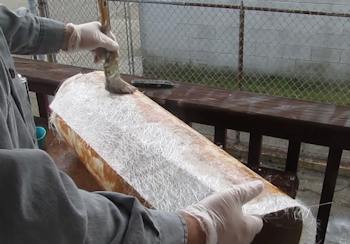
Continue to apply the resin. And when you run out of resin you mix up another batch and continue the process.
My cloth ended up being the perfect size for the telescope tube. But your tube might be a different size. It doesn't matter. You can cut and apply more pieces of cloth as you need them.
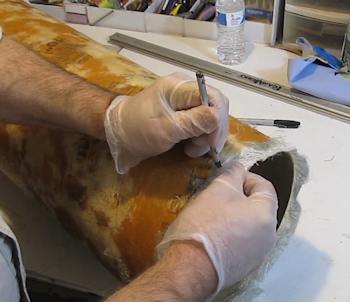
Once it has dried (Minimum 2 hours) trim the edges clean with a knife and with scissors.
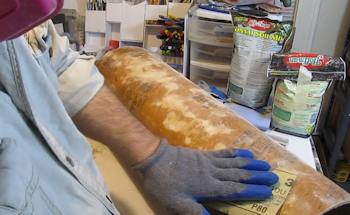
Next sand it with 80 grit sandpaper. This isn't to make it smooth as silk. This is to clean it up and make it good to handle without rough parts.
Because of the process of applying the resin with a paintbrush there will be bits of cloth and resin sticking up. These will sand down easily.
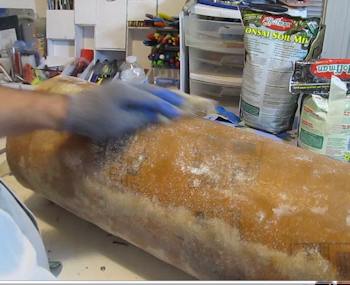
And that's it. Use a wet cloth to clean it up. Your fiberglassing work is complete.
 Let's continue with the tube making Let's continue with the tube making

An Astronaut's Guide to Life on Earth: What Going to Space Taught Me About Ingenuity, Determination, and Being Prepared for Anything
In his bestselling An Astronaut's Guide to Life on Earth , Hadfield takes readers deep into his years of training and space exploration to show how to make the impossible possible. Through eye-opening, entertaining stories, his vivid and refreshing insights will teach you how to think like an astronaut, and will change, completely, the way you view life on Earth-especially your own.

Do you like making projects and exploring a variety of hobbies?
Sign up for my free newsletter. I give you regular updates on hobbies and projects you can make. it is totally free and I don't share your email with anybody.
|
![]()






